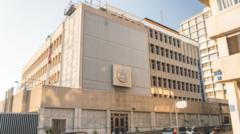The arrest of a U.S. academic in Thailand highlights tensions regarding freedom of expression in the nation, where harsh laws against royal criticism remain in effect.
American Academic Detained in Thailand for Royal Criticism

American Academic Detained in Thailand for Royal Criticism
U.S. State Department expresses concern over the arrest of Paul Chambers, charged under Thailand's lèse-majesté laws.
Paul Chambers, an American lecturer at Naresuan University, was detained in Thailand under the nation’s stringent lèse-majesté laws, prompting alarm from the U.S. State Department. His arrest marks a rare incident where a foreign national faces legal consequences for allegedly insulting the monarchy. Chambers has also been charged under the Computer Crimes Act, reflecting the country's growing scrutiny of online discourse.
The Thai lèse-majesté laws, among the harshest globally, prohibit any defamation or perceived threats against the royal family. Penalties extend from three to 15 years in prison, and their enforcement has drawn criticism from human rights advocates for stifling free speech. This high-profile arrest brings renewed attention to the implications of these laws, especially as Thai courts are expected to address numerous similar cases this year.
Tammy Bruce, a spokeswoman for the U.S. State Department, stated that the department has reached out to Thai officials concerning Chambers' situation. “We are reiterating our concerns related to the use of lèse-majesté laws,” Bruce remarked, emphasizing the need for Thailand to protect freedom of expression. U.S. consular officers are actively seeking access to Chambers to facilitate his rights and welfare.
As a treaty ally of Thailand, the United States is poised to closely monitor the proceedings and advocate for equitable treatment for Mr. Chambers amid rising apprehension over foreign detention under these contentious laws.






















